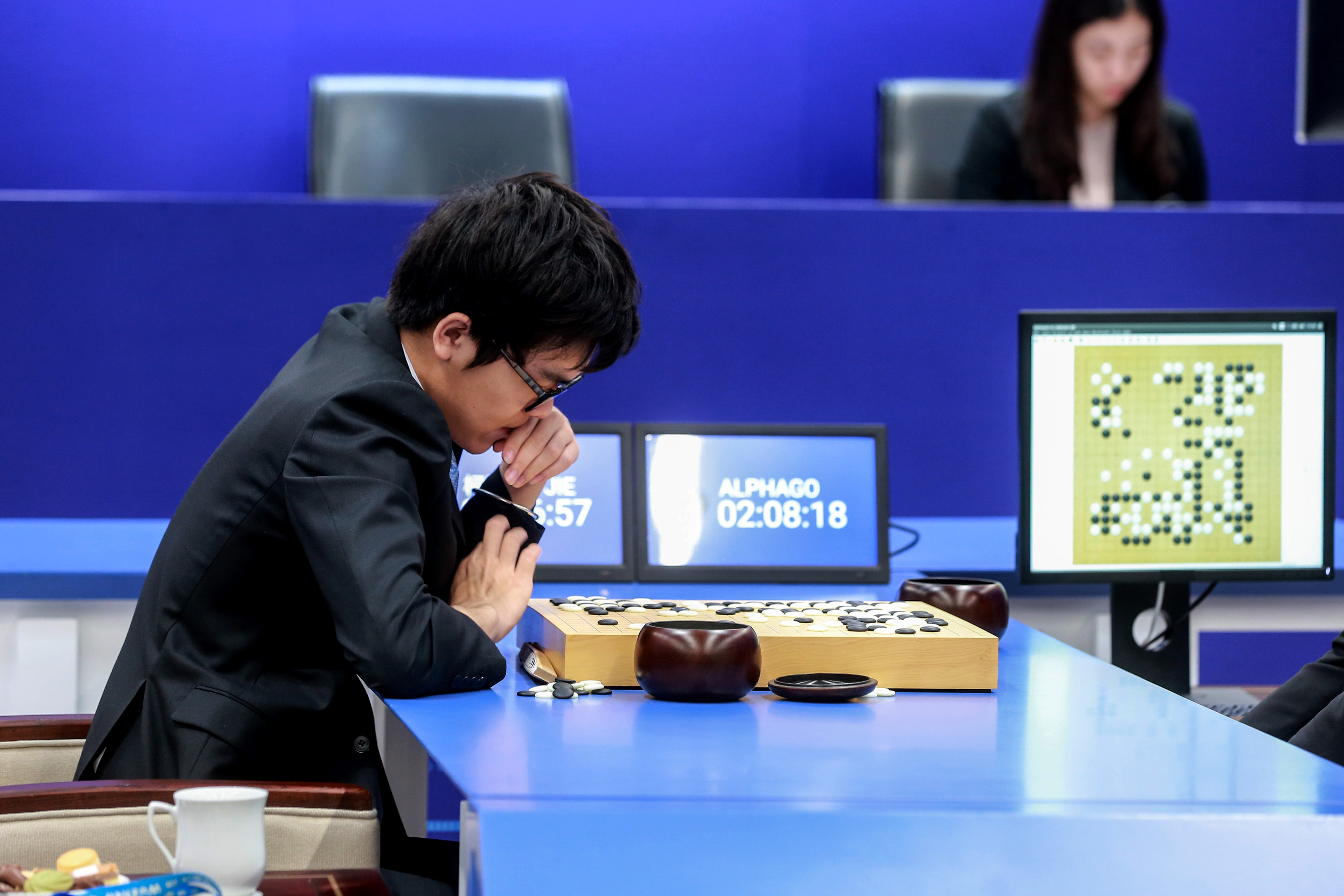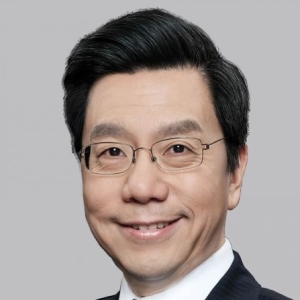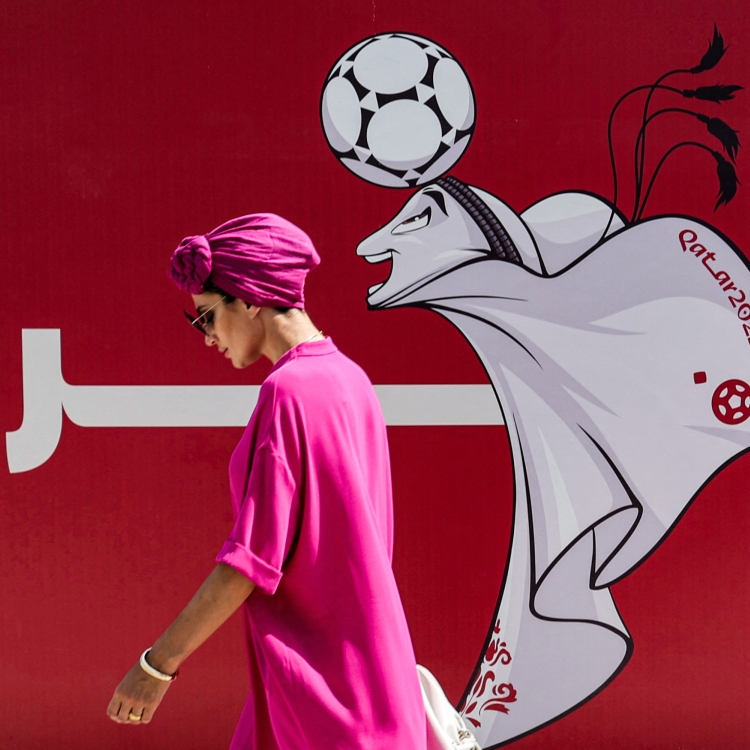magazine text block
For decades, the United States has dominated research in artificial intelligence. But China is catching up — quickly. AI has been part of China’s national strategy for years, with the government providing billions of dollars for research funding. This rivalry between the world’s two largest economies is the subject of the book AI Superpowers by Kai-Fu Lee, an entrepreneur and world-renowned expert in the field, who teases out the implications — both positive and worrisome — of AI in politics, economics, and the U.S.-China relationship.
In this excerpt, Lee explains how a highly-publicized match of the ancient game Go between a teenaged Chinese prodigy and the Google-built AlphaGo became China’s “Sputnik moment”: the incident that catalyzed Beijing’s feverish rush to match American capabilities in AI.
The Chinese teenager with the square-rimmed glasses seemed an unlikely hero to make humanity’s last stand. Dressed in a black suit, white shirt, and black tie, Ke Jie slumped in his seat, rubbing his temples and puzzling over the problem in front of him. Normally filled with a confidence that bordered on cockiness, the 19-year-old squirmed in his leather chair. Change the venue and he could be just another prep-school kid agonizing over an insurmountable geometry proof.
But on this May afternoon in 2017, he was locked in an all-out struggle against one of the world’s most intelligent machines, AlphaGo, a powerhouse of artificial intelligence backed by arguably the world’s top technology company: Google. The battlefield was a 19-by-19 lined board populated by little black and white stones — the raw materials of the deceptively complex game of Go. During gameplay, two players alternate placing stones on the board, attempting to encircle the opponent’s stones. No human on Earth could do this better than Ke Jie, but today he was pitted against a Go player on a level that no one had ever seen before.
Believed to have been invented more than 2,500 years ago, Go’s history extends further into the past than any board game still played today. In ancient China, Go represented one of the four art forms any Chinese scholar was expected to master. The game was believed to imbue its players with a Zen-like intellectual refinement and wisdom. Where games like Western chess were crudely tactical, the game of Go is based on patient positioning and slow encirclement, which made it into an art form, a state of mind.
The depth of Go’s history is matched by the complexity of the game itself. The basic rules of gameplay can be laid out in just nine sentences, but the number of possible positions on a Go board exceeds the number of atoms in the known universe. The complexity of the decision tree had turned defeating the world champion of Go into a kind of Mount Everest for the artificial intelligence community — a problem whose sheer size had rebuffed every attempt to conquer it. The poetically inclined said it couldn’t be done because machines lacked the human element, an almost mystical feel for the game. The engineers simply thought the board offered too many possibilities for a computer to evaluate.
But on this day AlphaGo wasn’t just beating Ke Jie — it was systematically dismantling him. Over the course of three marathon matches of more than three hours each, Ke had thrown everything he had at the computer program. He tested it with different approaches: conservative, aggressive, defensive, and unpredictable. Nothing seemed to work. AlphaGo gave Ke no openings. Instead, it slowly tightened its vise around him.
magazine quote block
magazine text block
The View From Beijing
What you saw in this match depended on where you watched it from. To some observers in the United States, AlphaGo’s victories signaled not just the triumph of machine over man but also of Western technology companies over the rest of the world. The previous two decades had seen Silicon Valley companies conquer world technology markets. Companies like Facebook and Google had become the go-to internet platforms for socializing and searching. In the process, they had steamrolled local startups in countries from France to Indonesia. These internet juggernauts had given the United States a dominance of the digital world that matched its military and economic power in the real world. With AlphaGo — a product of the British AI startup DeepMind, which had been acquired by Google in 2014 — the West appeared poised to continue that dominance into the age of artificial intelligence.
But looking out my office window during the Ke Jie match, I saw something far different. The headquarters of my venture-capital fund is located in Beijing’s Zhongguancun (pronounced “jong-gwan-soon”) neighborhood, an area often referred to as “the Silicon Valley of China.”
Today, Zhongguancun is the beating heart of China’s AI movement. To people here, AlphaGo’s victories were both a challenge and an inspiration. They turned into China’s “Sputnik Moment” for artificial intelligence.
To understand why, we must first grasp the basics of the technology and how it is set to transform our world. When the Soviet Union launched the first human-made satellite into orbit in October 1957, it had an instant and profound effect on the American psyche and government policy. The event sparked widespread U.S. public anxiety about perceived Soviet technological superiority, with Americans following the satellite across the night sky and tuning in to Sputnik’s radio transmissions. It triggered the creation of the National Aeronautics and Space Administration (NASA), fueled major government subsidies for math and science education, and effectively launched the “Space Race.” That nationwide American mobilization bore fruit 12 years later when Neil Armstrong became the first person ever to set foot on the moon.
AlphaGo scored its first high-profile victory in March 2016 during a five-game series against the legendary Korean player Lee Sedol, winning four to one. While barely noticed by most Americans, the five games drew more than 280 million Chinese viewers. Overnight, China plunged into an artificial intelligence fever. The buzz didn’t quite rival America’s reaction to Sputnik, but it lit a fire under the Chinese technology community that has been burning ever since.
When Chinese investors, entrepreneurs, and government officials all focus in on one industry, they can truly shake the world. Indeed, China is ramping up AI investment, research, and entrepreneurship on a historic scale. Money for AI startups is pouring in from venture capitalists, tech juggernauts, and the Chinese government. Chinese students have caught AI fever as well, enrolling in advanced degree programs and streaming lectures from international researchers on their smartphones. Startup founders are furiously pivoting, re-engineering, or simply rebranding their companies to catch the AI wave.
And less than two months after Ke Jie resigned his last game to AlphaGo, the Chinese central government issued an ambitious plan to build artificial intelligence capabilities. It called for greater funding, policy support, and national coordination for AI development. It set clear benchmarks for progress by 2020 and 2025, and it projected that by 2030 China would become the center of global innovation in artificial intelligence, leading in theory, technology, and application. By 2017, Chinese venture-capital investors had already responded to that call, pouring record sums into artificial intelligence startups and making up 48% of all AI venture funding globally, surpassing the United States for the first time.
magazine quote block
magazine text block
A Game and a Game Changer
Underlying that surge in Chinese government support is a new paradigm in the relationship between artificial intelligence and the economy. While the science of artificial intelligence made slow but steady progress for decades, only recently did progress rapidly accelerate, allowing these academic achievements to be translated into real-world use-cases.
The technical challenges of beating a human at the game of Go were already familiar to me. As a young Ph.D. student researching artificial intelligence at Carnegie Mellon University, I studied under pioneering AI researcher Raj Reddy. In 1986, I created the first software program to defeat a member of the world championship team for the game Othello, a simplified version of Go played on an eight-by-eight square board. It was quite an accomplishment at the time, but the technology behind it wasn’t ready to tackle anything but straightforward board games.
Deep Blue had essentially “brute forced” its way to victory — relying largely on hardware customized to rapidly generate and evaluate positions from each move. It had also required real-life chess champions to add guiding heuristics to the software. Yes, the win was an impressive feat of engineering, but it was based on long-established technology that worked only on very constrained sets of issues. Remove Deep Blue from the geometric simplicity of an eight-by-eight square chess board and it wouldn’t seem very intelligent at all. In the end, the only job it was threatening to take was that of the world chess champion.
This time, things are different. The Ke Jie versus AlphaGo match was played within the constraints of a Go board, but it is intimately tied up with dramatic changes in the real world. Those changes include the Chinese AI frenzy that AlphaGo’s matches sparked amid the underlying technology that powered it to victory.
AlphaGo runs on deep learning, a groundbreaking approach to artificial intelligence that has turbocharged the cognitive capabilities of machines. Deep-learning-based programs can now do a better job than humans at identifying faces, recognizing speech, and issuing loans. For decades, the artificial intelligence revolution always looked to be five years away. But with the development of deep learning over the past few years, that revolution has finally arrived. It will usher in an era of massive productivity increases but also widespread disruptions in labor markets — and profound socio-psychological effects on people — as artificial intelligence takes over human jobs across all sorts of industries.
During the Ke Jie match, it wasn’t the AI-driven killer robots some prominent technologists warn of that frightened me. It was the real-world demons that could be conjured up by mass unemployment and the resulting social turmoil. The threat to jobs is coming far faster than most experts anticipated, and it will not discriminate by the color of one’s collar, instead striking the highly trained and poorly educated alike. On the day of that remarkable match between AlphaGo and Ke Jie, deep learning was dethroning humankind’s best Go player. That same job-eating technology is coming soon to a factory and an office near you.
magazine text block
The Ghost in the Go Machine
But in that same match, I also saw a reason for hope. Two hours and 51 minutes into the match, Ke Jie had hit a wall. He’d given all that he could to this game, but he knew it wasn’t going to be enough. Hunched low over the board, his eyebrow began to twitch as he pursed his lips. Realizing he couldn’t hold his emotions in any longer, he removed his glasses and used the back of his hand to wipe tears from both of his eyes. It happened in a flash, but the emotion behind it was visible for all to see.
Those tears triggered an outpouring of sympathy and support for Ke. Over the course of these three matches, Ke had gone on a rollercoaster of human emotion: confidence, anxiety, fear, hope, and heartbreak. It had showcased his competitive spirit, but I saw in those games an act of genuine love: a willingness to tangle with an unbeatable opponent out of pure love for the game, its history, and the people who play it. Those people who watched Ke’s frustration responded in kind. AlphaGo may have been the winner, but Ke became the people’s champion. In that connection — human beings giving and receiving love — I caught a glimpse of how humans will find work and meaning in the age of artificial intelligence.
I believe that the skillful application of AI will be China’s greatest opportunity to catch up with — and possibly surpass — the United States. But more importantly, this shift will create an opportunity for all people to rediscover what it is that makes us human.
Excerpted from AI Superpowers by Kai-Fu Lee. Copyright © 2018 by Houghton Mifflin. All rights reserved. No part of this excerpt may be reproduced or reprinted without permission in writing from the publisher.





